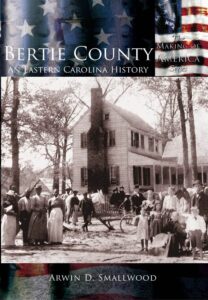NOTE: THIS WEBSITE IS A WORK IN PROGRESS. RESOURCES AND DATA ARE ADDED DAILY.
IMPORTANT: We are in urgent need of funding to keep this project alive and ensure its future. If you’re enjoying the site and see our vision for the project, please consider contributing to the Melungeon Roots crowdfunding campaign today. It is only with your help that we can continue this work. MORE INFO / DONATE
Thanks so much for your support! – Jes
![]()
Bertie County: An Eastern Carolina History
share:
Some buttons on this page link to external websites. If you visit one of our affiliate sites and make a purchase, I may receive a small commission at no extra cost to you. More info
- UPDATED: 6.29.2025
- status: in progress
- regional
- history
editor:
n/a
publisher:
series:
date:
10.16.2002
ISBN:
9780738523958
pages:
160
notes:
contents:
description:
One of the oldest counties in North Carolina, Bertie County lies in the western coastal plains of northeastern North Carolina, bordered to the east by Albemarle Sound and the tidewater region and to the west by the Roanoke River in the piedmont.
The county's waterways and forests sustained the old Native American villages that were replaced in the eighteenth century by English plantations, cleared for the whites by African slaves. Bertie County's inhabitants successfully developed and sustained a wide variety of crops including the ""three sisters""-corn, beans, and squash-as well as the giants: tobacco, cotton, and peanuts. The county was a leading exporter of naval stores and mineral wealth and later, a breadbasket of the Confederacy.
Bertie County: An Eastern Carolina History documents the long history of the region and tells how its people, at first limited by the landscape, radically altered it to support their needs. This is the story of the Native Americans, gone from the county for 200 years but for arrowheads and other artifacts. It is the story of the African slaves and their descendants and the chronicle of their struggles through slavery, the Jim Crow era, and the Civil Rights Movement. It is also the story of the Europeans and their rush to tame the wilderness in a new land. Their entwined history is clarified in dozens of new maps created especially for this book, along with vivid illustrations of forgotten faces and moments from the past.
places:
peoples:
CMOS:
author-date:
Other Resources
- Revealing America’s Dark-Skinned Past, Vol. 1
- Original Sins: The (Mis)education of Black and Native Children and the Construction of American Racism
- An Indigenous Peoples’ History of the United States
- History of the Early Settlement and Indian Wars of Western Virginia
- 1491: New Revelations of the Americas Before Columbus
- Wisdom’s Daughter’s: Conversations with Women Elders of Native America

